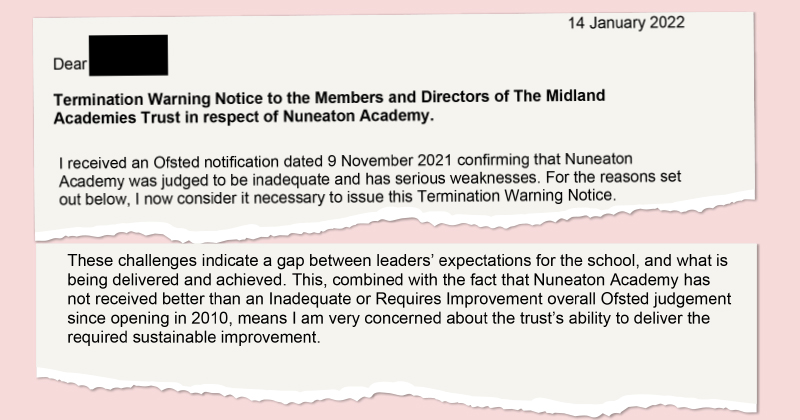An academy rated ‘inadequate’ three times over the past decade has finally been threatened with transfer to another trust.
The leeway given to Nuneaton Academy in Warwickshire has sparked calls for a level playing field, with other academies and all maintained schools facing far swifter intervention.
Government guidance says regional school commissioners (RSCs) will “act swiftly and robustly where there is failure in an academy”.
Ministers say this is a cornerstone of their academy revolution – failing maintained schools were regularly “left languishing” under councils.
Third time unlucky
Nuneaton Academy was converted in 2010, joining the Midland Academies Trust.
It was rated ‘requires improvement’ in 2012 and ‘inadequate’ two years later. Ofsted criticised teaching and a lack of “urgency” about change, which the trust promised to “accelerate”.
But results slipped further in 2015 and by 2016 it was again rated ‘inadequate’. Ofsted praised progress under new leaders, but repeated its criticism of “weak teaching”.

Yet it avoided rebrokering until a third ‘inadequate’ rating last November when Ofsted said pupils did not learn the curriculum “well enough”.
This month Andrew Warren, the West Midlands RSC, finally issued a termination warning notice.
He said the gap between leaders’ expectations and reality, and the decade of poor inspection ratings, left him “very concerned” about improvement.
The trust declined to comment.
Leeway ‘seems inconsistent’

Schools Week’s analysis of 29 termination warning notices since 2019 found most followed one ‘inadequate’ rating. One other trust escaped swift threats – the Sprites Primary Academy in Ipswich was warned after its second ‘inadequate’ rating.
While several trusts avoided notices for more than a year after a poor inspection, most delays were attributed to Covid.
Landewednack Community Primary School in Cornwall received a recent warning after one ‘inadequate’ rating last year, the Southerly Point Co-operative MAT school’s first inspection since conversion.
Rachel Holder, its chair of governors, said: “There does seem to be an inconsistency, with some schools given several opportunities to implement changes, whilst others are given no time to show improvements are underway.”
She said RSC scrutiny was “not unreasonable”, but called for notices to be issued and potential transfers evaluated only if re-inspection showed limited progress. The “unhelpful” uncertainty distracted from improvement efforts, she said.
Paul Whiteman, the general secretary of the school leaders’ union NAHT, said that when a school was underperforming, support and expert advice were vital.
“Simply rebrokering does not automatically improve a school any more than academising does. It is the leadership and people in a school that make the difference, not the name over the door.”

More ‘draconian’ rules for maintained schools
Academy transfers remain rare. In 2017-18, just 255 of 7,600 academies moved trust, with about 60 of those the result of government intervention.
Guidance states rebrokering decisions are “on an individual basis”. There is also a contrast to the intervention powers for local authority schools.
While RSCs have the “power” to rebroker failing academies, academising failing maintained schools is a “duty”.
RSC performance goals also include improvement rates for converting schools, but not rebrokered academies.
Anne West, an education professor at London School of Economics, urged more consistency. “Maintained school procedures are far more draconian and don’t allow discretion.”
‘Same energy’ improving all schools
The government has grudgingly allowed schools that turn around poor Ofsted ratings to resist conversion.
But Yew Tree Primary School in Walsall had to go to court to stop conversion after Covid inspection suspensions removed its chance to show improvement. Jamie Barry, the school’s head, also backed consistency, but said all schools deserved discretion and support, not “automatic changes”.
A DfE spokesperson said RSCs take “swift action”. They work to improve or rebroker ‘inadequate’ academies “with the same energy as we would with a maintained school”.
But they added trusts have effective internal school improvement structures, highlighting 2019 Ofsted figures suggesting more than seven in 10 sponsored academies were now ‘good’ or ‘outstanding’.
















Your thoughts